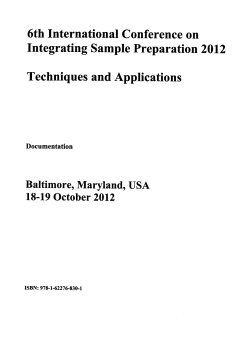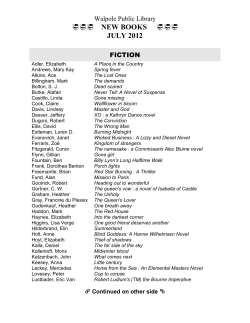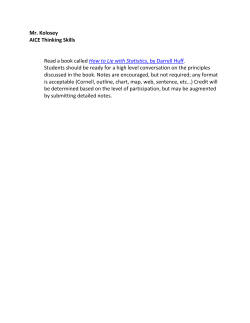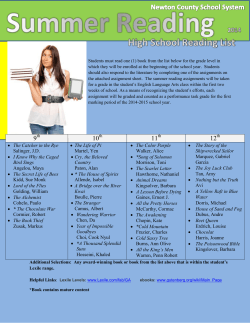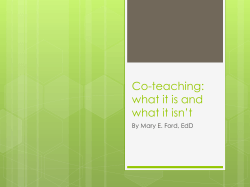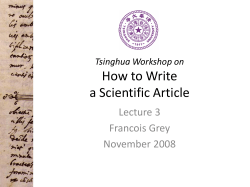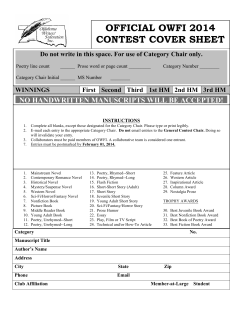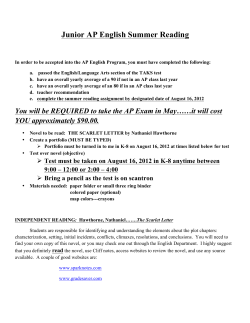
Document 25888
Summer Reading Assignment English 3 / English 3 Honors A. Analysis Question Assignment (50 points each –> 100 points total) All English III students should choose TWO novels from the list (included at the end of this packet). For each novel you are required to read, you need to choose ONE analysis question to answer in a minimum of 250 words (approximately one page, typed, double-‐spaced, and in MLA format). Your answers should reflect a depth of understanding of the text and its theme. 1. Choose one character from the novel to analyze in depth. What are the attributes, motivations, and conflicts for this character? Do you classify this character as a hero, villain, or something else? Why? 2. What is the significance of the title of this work? What moment, character, or passage best exemplifies this? 3. What do you feel is the most important word, phrase, or paragraph? Explain why it is important to the central themes of the novel. *Note: For this question, you may choose up to 3 words, phrases, or paragraphs to discuss in your response. 4. What is the overall theme (moral, message, or life lesson) of the book? Which moment or character best exemplifies this to you? 5. What does this novel say about the time period/historical context of the novel? If the novel is written in a different time than when it is set, also examine what the novel says about the time period in which it was written. 6. Copy one or two poignant passages (approximately one page in length) from the selection you read, including page numbers. Explain the quotation in depth and analyze what ideas the author wanted you to think about while reading this text. B. Dialectical Journal (100 points total) for English III Honors ONLY • • The Catcher in the Rye by J.D. Salinger (PDF can be found for free at: http://sleeplessinmumbai.files.wordpress.com/2008/09/jd-‐salinger-‐catcher-‐in-‐the-‐ rye.pdf) OR The Scarlet Letter by Nathaniel Hawthorne (http://www.sparknotes.com/nofear/lit/the-‐ scarlet-‐letter/) You are to keep a dialectical journal for ONE of the two novels listed above. You can use neatly stapled pieces of paper, a spiral notebook, or a composition book for this assignment. See the attached handout for specifics about the journal and grading. Remember your literary terms from English II: theme, conflict, symbols, imagery, etc. The more thoughtful and detailed your notes are, the higher your grade! Good news -‐ both texts can be found online for free! There are also many study guides online, including SparkNotes. SparkNotes.com offers a No Fear translation of The Scarlet Letter, which provides a line-‐by-‐line translation into modern English. This can really help you understand the text better, but you will still need to analyze the original text and choose your own quotes to analyze these two pieces of American Literature. NOTE: There will be a multiple-‐choice test given to students about the novel you choose to read on the second Friday of the school year. This test will count as a grade for all students. It is imperative that you complete your summer reading assignment to start off your junior year right! Summer Reading Assignment English 3 / English 3 Honors All students will pick two titles from the list to read and complete analysis questions. Anderson, M. T. Feed. For Titus and his friends, it started out like any ordinary trip to the moon -‐ a chance to party during spring break and play with some stupid low-‐grav at the Ricochet Lounge. But that was before the crazy hacker caused all their feeds to malfunction, sending them to the hospital to lie around with nothing inside their heads for days. And it was before Titus met Violet, a beautiful, brainy teenage girl who has decided to fight the feed and its omnipresent ability to categorize human thoughts and desires. Bradbury, Jennifer. Shift. Atheneum, 2008. When best friends Chris and Win go on a cross country bicycle trek the summer after graduating and only one returns, the FBI wants to know what happened. Brown, Dan. The Lost Symbol. After scores of Da Vinci Code knockoffs, spinoffs, copies and caricatures, Brown has had the stroke of brilliance to set his breakneck new thriller not in some far-‐off exotic locale, but right here in our own backyard. Everyone off the bus, and welcome to a Washington, D.C., they never told you about on your school trip when you were a kid, a place steeped in Masonic history that, once revealed, points to a dark, ancient conspiracy that threatens not only America but the world itself. Chbosky, Stephen. The Perks of Being a Wallflower. * MTV Books/Pocket Books, 1999. In this controversial, coming-‐of-‐age novel, Charlie’s collection of letters to an unspecified recipient details the humorous trials and tribulations of trying to discover who he is and who he might become. Collins, Suzanne. The Hunger Games Trilogy. (3 books) As punishment for a rebellion generations previous against the Capitol wherein twelve of the districts were defeated and the thirteenth destroyed, every year one boy and one girl from each of the remaining twelve districts, between the ages of twelve and eighteen, are selected by lottery and forced to participate in the "Hunger Games". The Games are a televised event where the participants, called "tributes", must fight to the death in a dangerous outdoor arena until only one remains. The winning tribute and his/her corresponding district is then rewarded handsomely with food and plenty. The purpose of the Hunger Games is to provide entertainment for the Capitol and to serve as a warning to the Districts to remind them of the Capitol's power and lack of remorse. Crutcher, Chris. Deadline. * Ben Wolf has big things planned for his senior year. Had big things planned. Now what he has is some very bad news and only one year left to make his mark on the world. How can a pint-‐sized, smart-‐mouthed seventeen-‐ year-‐old do anything significant in the nowheresville of Trout, Idaho? Ellison, Ralph. Invisible Man. Ellison won the National Book Award for fiction, establishing himself as one of the key writers of the century. The nameless narrator of the novel describes growing up in a black community in the South, attending a Negro college from which he is expelled, moving to New York and becoming the chief spokesman of the Harlem branch of "the Brotherhood", and retreating amid violence and confusion to the basement lair of the Invisible Man he imagines himself to be. Foer, Jonathan Safran. Extremely Loud and Incredibly Close. * Houghton Mifflin, 2005. Oskar Schell is an inventor, Francophile, tambourine player, Shakespearean actor, jeweler, pacifist. He is nine-‐years-‐old; and he is on an urgent, secret search through the five boroughs of New York to find the lock that fits a mysterious key belonging to his father, who died in the attacks on the World Trade Center. Grahame-‐Smith, Seth. Abraham Lincoln: Vampire Hunter. Grand Central, 2010. Many people know about Abe Lincoln’s political successes, but few know that after his mother was killed by a vampire Old Abe became a ruthless vampire hunter. This “biography,” packed full of historical facts, will not disappoint readers who like a good horror story. Gruen, Sara. Water for Elephants: A Novel. * Algonquin, 2006. Jacob Jankowski, a penniless orphan forced to drop out of veterinary school during the Great Depression, joins a traveling circus. He forges a bond with Rosie the elephant and Marlena, the beautiful star of an equestrian act, whose husband is a handsome circus boss with a violent temper. Alex Award 2007 Hawking, Stephen. A Briefer History of Time. “Hawking's A Brief History of Time, published in 1988, was a surprise best-‐ seller but a tough read for most people who tackled it. Hawking received many requests for a version that would make his Summer Reading Assignment English 3 / English 3 Honors discussion of deep questions about the universe more accessible. This book does that. Hawking and Mlodinow, a physicist turned science writer, proceed by small and careful steps from the early history of astronomy to today's efforts to construct a grand unified theory of the universe.” Hemingway, Ernest. The Sun Also Rises. A landmark Lost Generation story, The Sun Also Rises is a poignant look at the disillusionment and angst of the post-‐World War I generation, the novel introduces two of Hemingway's most unforgettable characters: Jake Barnes and Lady Brett Ashley. The story follows the flamboyant Brett and the hapless Jake as they journey from the wild nightlife of 1920s Paris to the brutal bullfighting rings of Spain with a motley group of expatriates. It is an age of moral bankruptcy, spiritual dissolution, unrealized love, and vanishing illusions. Irving, John. A Prayer for Owen Meany. In the summer of 1953, two eleven-‐year-‐old boys—best friends—are playing in a Little League baseball game in Gravesend, New Hampshire. One of the boys hits a foul ball that kills the other boy's mother. The boy who hits the ball doesn't believe in accidents; Owen Meany believes he is God's instrument. What happens to Owen after that 1953 foul ball is extraordinary. Kerouac, Jack. On the Road. With On the Road, Kerouac discovered his voice and his true subject—the search for a place as an outsider in America. On the Road swings to the rhythms of fifties underground America, jazz, sex, generosity, chill dawns, and drugs, with Sal Paradise and his hero Dean Moriarty, traveler and mystic, the living epitome of Beat. Krauker, John. Into the Wild. In April 1992 a young man from a well-‐to-‐do family hitchhiked to Alaska and walked alone into the wilderness north of Mt. McKinley. His name was Christopher Johnson McCandless. He had given $25,000 in savings to charity, abandoned his car and most of his possessions, burned all the cash in his wallet, and invented a new life for himself. Four months later, his decomposed body was found by a moose hunter. Malcolm X. The Autobiography of Malcolm X. * Malcolm X's searing memoir belongs on the small shelf of great autobiographies. The reasons are many: the blistering honesty with which he recounts his transformation from a bitter, self-‐ destructive petty criminal into an articulate political activist, the continued relevance of his militant analysis of white racism, and his emphasis on self-‐respect and self-‐help for African Americans. McCarthy, Cormac. The Road. * Alfred A. Knopf, 2006. In a post-‐apocalyptic landscape, a man and a boy struggle toward the unknown. This dark and doomed quest offers a spiritual sense of soul and humanity. Pulitzer Prize, Fiction 2007 Morrison, Toni. Beloved.* Winner of the Pulitzer Prize, Toni Morrison’s Beloved is an innovative portrait of a woman haunted by her past as a slave. This novel blurs the lines between reality and the supernatural as the narrator relives terrifying encounters and memories. Prose, Francine. After. A school-‐shooting incident in nearby Pleasant Valley causes Tom's high school administrators to be worried about a ripple effect. A crisis counselor is hired and a watchdog atmosphere grows as the teens' privileges rapidly disappear. Tom and his sophomore classmates are annoyed but not overly concerned about the new security restrictions until they notice eerie disappearances of friends who fail to conform, including Tom's two best friends…. School has become a prison. There's no way to stop it. Remarque, Erich. All Quiet on the Western Front. A young German soldier in World War I experiences pounding shellfire, hunger, sickness, and death. Silko, Leslie Marmon. Ceremony. Tayo, a young Native American, has been a prisoner of the Japanese during World War II, and the horrors of captivity have almost eroded his will to survive. His return to the Laguna Pueblo reservation only increases his feeling of estrangement and alienation. While other returning soldiers find easy refuge in alcohol and senseless violence, Tayo searches for another kind of comfort and resolution. Stein, Garth. The Art of Racing in the Rain: A Novel. HarperCollins, 2008. Enzo is an old soul who just happens to be a dog. He is devoted to Denny who is a race car driver. The reader will be captivated as Enzo tells his master’s story and prepares for his next life…as a human. Summer Reading Assignment English 3 / English 3 Honors Stockett, Kathryn. The Help. Amy Einhorn Books, 2009. College graduate Skeeter Phelan, a white twenty-‐four-‐year-‐old social misfit and an aspiring writer, decides to secretly compile the untold stories of black domestic workers in her hometown of Jackson, Mississippi. Her fellow conspirators, two black women, Aibileen and Minny, risk their lives and livelihoods in the racially charged South of the 1960s to help collect the interviews she seeks. Vonnegut, Kurt. Slaughterhouse-‐Five. Slaughterhouse-‐Five, an American classic, is one of the world’s great antiwar books. Centering on the infamous firebombing of Dresden, Billy Pilgrim’s odyssey through time reflects the mythic journey of our own fractured lives as we search for meaning in what we fear most. Walls, Jeanette. The Glass Castle. Rex and Rose Mary Walls had four children. Rex was a charismatic, brilliant man who, when sober, captured his children's imagination, teaching them physics, geology, and above all, how to embrace life fearlessly. Rose Mary, who painted and wrote and couldn't stand the responsibility of providing for her family, called herself an "excitement addict." Later, when the money ran out the romance of the wandering life faded. As the dysfunction of the family escalated, Jeannette and her brother and sisters had to fend for themselves, supporting one another as they weathered their parents' betrayals and, finally, found the resources and will to leave home. Warren, Robert Penn. All the King’s Men. Winner of the 1947 Pulitzer Prize. It traces the rise and fall of demagogue Willie Stark, a fictional Southern politician who resembles the real-‐life Huey "Kingfish" Long of Louisiana. Stark begins his career as an idealistic man of the people, but he soon becomes corrupted by success and caught in a lust for power. Please Note: Some texts may include adult situations. Pick a text that you are comfortable reading. Please use Amazon.com to review the titles that interest you or speak with a librarian to make the best choice. Happy reading! GRADING RUBRIC • • • Detailed, meaningful passages, plot and quote selections Thoughtful interpretation and commentary about the text; Avoids clichés. Includes comments about literary elements such as diction, imagery, syntax, and how these elements contribute to the meaning of the text. Makes insightful personal connections and asks thought-provoking, insightful questions Coverage of text is complete and thorough Journal is neat, organized and professional looking; student has followed directions in the organization of journal • • • • • • Less detailed, but good plot and quote selections Some intelligent commentary; addresses some thematic connections Includes some literary elements, but less on how they contribute to the meaning Some personal connection; asks pertinent questions Adequately addresses all parts of reading assignment Journal is neat and readable; student has followed directions in the organization of journal • • • • • • Few good details from the text Most of the commentary is vague, unsupported, or plot summary/paraphrase Some listing of literary elements; virtually no discussion on meaning Limited personal connection; asks few, or obvious questions Addresses most of the reading assignment, but is not very long or thorough Journal is relatively neat, but may be difficult to read. Student has not followed all directions in journal organization: loose-leaf, no columns, not in separate notebook, etc. • • • • • • Hardly any good details from the text All notes are plot summary or paraphrase Few literary elements, virtually no discussion on meaning Limited personal connections, no good questions Limited coverage of the text: way too short Did not follow directions in organizing journal; difficult to read or follow • • • A B C D or D/F
© Copyright 2025
